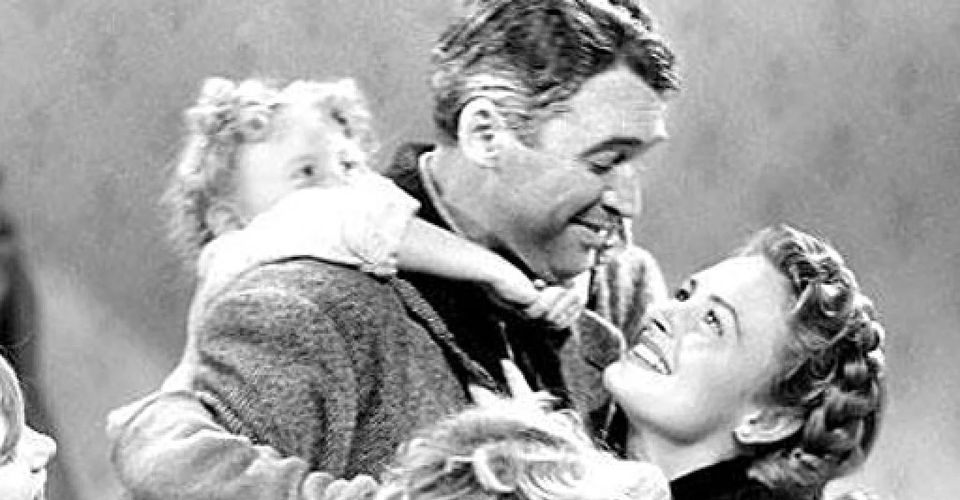It’s A Wonderful Life: 10 Great Life Lessons Learned From This Classic Christmas Movie

It’s A Wonderful Life is not only a classic Christmas film, but it’s also one of the greatest films ever made. The story concerns George Bailey, played by Jimmy Stewart, who, when attempting to commit suicide due to his perceived life failures, is shown an alternate reality of what life would have been like if he were never born.
The film initially flopped when it was released in 1946, but years later, due to a clerical error, the film’s copyright wasn’t renewed, which allowed the film to enter the public domain, where it could be shown many times on television for free. It caught on with audiences around the world, discovering it for the masterpiece it is and the lessons that it teaches.
10 Don’t Compare Yourself To Others

George often compares himself to Sam Wainwright, a very successful friend. Sam is initially his competition for Mary, but George wins her heart. However, he remains jealous that wealthy Sam left Bedford Falls behind to do “important things.” Meanwhile, George’s brother Harry becomes a WWII war hero, and George sits between these two, neither rich nor glorious.
George doesn’t see what he has that others do not, like his wife Mary and his family’s love, which are worth so much more than any actual currency or fame anyone else may possess.
9 Sometimes The Villain Wins

Despite the fact that It’s A Wonderful Life was produced during a time when Hollywood censors required punishment for movie villains, the greedy banker Potter gets away with his theft of the $8,000.
Life’s villains could be people, financial problems, natural disasters, or illness and these often cannot be corrected or reversed. Like George Bailey, it’s important to rise above these issues. In the end, technically Potter wins since no one discovers he stole the money. However, George’s life isn’t ruined because the town raises the money needed, and more importantly, his perspective changes.
8 Great Sacrifice Leads To Great Reward

Throughout George’s life, he has big dreams that he’s constantly forced to sacrifice. Like his father, he puts others first. When he’s a kid, he sacrifices part of his hearing while saving drowning Harry. Following his father’s death, he sacrifices his trip abroad, takes over the Bailey Building & Loan, and gives his college money to Harry. He even plans a glorious honeymoon with his wife, Mary, but ultimately uses the money for customers in need after the B&L goes broke.
All of these sacrifices make him feel he can’t get ahead and ultimately cause him to become bitter about his lot in life. However, these sacrifices mean something because in the hour of his greatest need, the community he sacrificed so much for comes to his rescue and helps him.
7 Realize Your Blessings

Over the course of the film, George becomes increasingly frustrated with his life. When he loses the $8,000, his problems increase and he could land in jail. Before he reveals this to his family, he’s short with them, questioning his wife why they had so many children and criticizing their imperfect house.
However, after he’s shown what life would be like without him, his perspective changes. He appreciates everything he does have, like his wonderful family, and expresses his love for their drafty house. George is even exuberant at the prospect of going to jail because he now knows all the success he actually has and the blessings he possesses, like friends and family, so being carted off to prison doesn’t matter anymore.
6 Character Is More Important Than Cash

At the film’s conclusion, Harry proclaims that George is the “richest man in town.” In actuality, the richest man in town is Potter, but he’s a terrible person. Harry’s statement doesn’t reflect that George is the financially wealthiest person in town now because he raised all the money he needed, but that he’s the richest in character. He’s so rich in character that his community comes to his aid.
This abundance of character makes him likable, making him richer than mean, greedy, and friend-less Potter. Essentially, George discovers the effect he has on others is the greatest currency he has. What’s meaningful to Potter is actual currency, which he can’t take with him when he dies. While George may not be rich, he’ll leave behind the memory of what was in his heart.
5 Integrity Matters

Potter notices that George’s business, while only modestly profitable, is growing, so he offers him an assistant job. The job comes with a great salary and the opportunity for George to fulfill his dreams and travel. George flips over the opportunity and takes Potter’s hand to shake it but, at that moment, realizes something. He’s about to sell his soul to the devil.
George realizes that Potter will now own Bailey Park and probably shut it down when he takes over. He also probably remembers the pain Potter has caused Bedford Falls and his family and knows he cannot make a deal with this awful man, even if that means giving up a better life for himself and his family.
4 Share The Wealth

A sign in George’s father’s office reads “All You Can Take With You Is That Which You Have Given Away.” The difference between Potter and the Bailey Building and Loan is that greedy banker Potter believes in hoarding power and money, and the loaning Baileys believe in what you can share.
Potter believes that to be the best is to acquire the most and only help those he deems deserve it, but the Baileys believe in sharing what you have to help others so they can help themselves.
3 Grace

It’s a Wonderful Life is full of undeserved favors. The Baileys practice grace while Potter clearly doesn’t. If tenants miss payments under Potter, they’re thrown out, while the Baileys let them stay, much to their own possible financial detriment, but they know it’s the right thing to do.
George could’ve easily blamed Uncle Billy for losing the $8,000, but instead he bears the burden himself. When he tells Potter he lost the $8,000, Potter (who knows Uncle Billy lost it) replies “YOU lost $8,000?” He’s shocked that George is admitting to something he didn’t do. Later, George flips out in front of Mary and the children. She could have left him but, instead, she rallies support to help him and, in the end, shows grace to a man who gave it to so many others.
2 One Life Touches So Many Others

It’s A Wonderful Life brilliantly plays out George’s entire life, before showing him and it’s viewers a version where he never existed. This Twilight Zone-esque change occurs well into the film and therefore, the emotion, upon seeing life without him, is earned, because viewers have spent so much time learning what he means to everyone.
George sees his brother would have died, Potter takes over Bedford Falls, and Mary spends her life alone. Ultimately, George realizes that even though he’s feeling worthless and that he doesn’t matter, he discovers his worth is greater than he thinks because he’s had a positive impact on others, and him not around, like Clarence the angel says, “leaves an awful hole.”
1 “No Man Is A Failure Who Has Friends”

One of It’s a Wonderful Life’s greatest moments is when George finds that the angel Clarence has gifted him a copy of Tom Sawyer. The camera pushes in on an inscription that reads “Remember, no man is a failure who has friends.”
Throughout the film, George sees himself as a failure because he never left Bedford Falls, traveled the world, or achieved his dreams. Instead, by staying home, he improved the lives of so many people and, in doing so, made friends. In the final scene, these friends show their gratitude to him for all he’s done for them. The fact that everyone donates more than George needed speaks volumes. While Potter might spend that Christmas Eve wealthy, he will be alone, but because George is spending it with appreciative friends, he’s more of a success than Potter will ever be.
About The Author
















